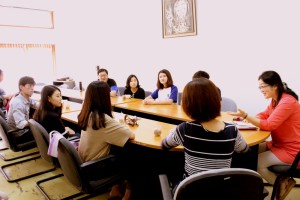CCA Hosts Students from Dure Church, South Korea

A team of ten students from Dure Church, a member of the Presbyterian Church of Korea in South Korea undertook a ten-day field visit to refugee camps, social development and diaconal ministry of the Church of Christ in Thailand and a dialogue at the headquarters of the Christian Conference of Asia on ecumenical formation and ecumenical movement. The youth team had exposure visits to the Maelah Refugee Camp in Mae Sot, where they learned from the experiences of ethnic Karen indigenous young people who live inside the camp.
Interested in grassroot social movements, the primary objective of their trip was to research refugees, social development and welfare programs, and churches’ mission in the area.
During the dialogue at CCA headquarters the students opined how Korean society has been unaware of the plight of their immediate neighbours, and especially the status of refugees and other vulnerable communities.
Rev. Seo, the coordinator of the team who accompanies the team, remarked that the “tour visit was a transformative encounter, and was the first of many encounters I hope that the students have in their Christian life. The students had very little knowledge of CCA and the ecumenical movement in Asia, but I believe that this transforming moment will challenge the students and develop into more participation.”
During the dialogue, the participants expressed the importance of youth involvement in the ecumenical movement.










